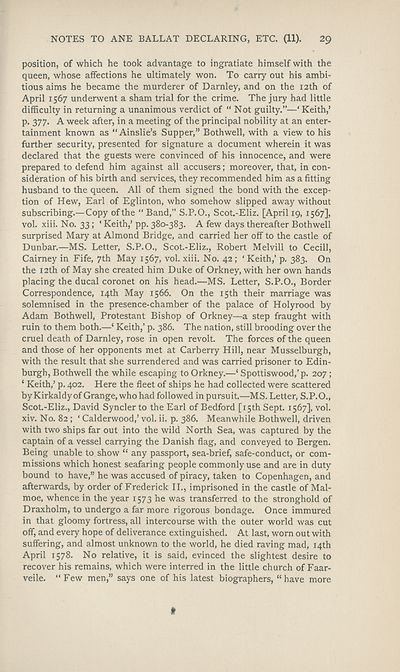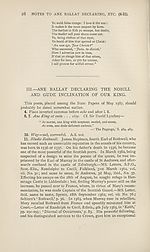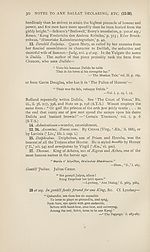Scottish Text Society publications > Old series > Satirical poems of the time of the reformation > Volume 2, 1893
(45)
Download files
Complete book:
Individual page:
Thumbnail gallery: Grid view | List view

NOTES TO ANE BALLAT DECLARING, ETC. (11). 29
position, of which he took advantage to ingratiate himself with the
queen, whose affections he ultimately won. To carry out his ambi¬
tious aims he became the murderer of Darnley, and on the 12th of
April 1567 underwent a sham trial for the crime. The jury had little
difficulty in returning a unanimous verdict of “ Not guilty.”—‘ Keith,’
p. 377. A week after, in a meeting of the principal nobility at an enter¬
tainment known as “Ainslie’s Supper,” Bothwell, with a view to his
further security, presented for signature a document wherein it was
declared that the guests were convinced of his innocence, and were
prepared to defend him against all accusers; moreover, that, in con¬
sideration of his birth and services, they recommended him as a fitting
husband to the queen. All of them signed the bond with the excep¬
tion of Hew, Earl of Eglinton, who somehow slipped away without
subscribing.— Copy of the “ Band,” S.P.O., Scot.-Eliz. [April 19, 1567],
vol. xiii. No. 33; ‘ Keith,’ pp. 380-383. A few days thereafter Bothwell
surprised Mary at Almond Bridge, and carried her off to the castle of
Dunbar.—MS. Letter, S.P.O., Scot.-Eliz., Robert Melvill to Cecill,
Cairney in Fife, 7th May 1567, vol. xiii. No. 42 ; ‘ Keith,’ p. 383. On
the 12th of May she created him Duke of Orkney, with her own hands
placing the ducal coronet on his head.—MS. Letter, S.P.O., Border
Correspondence, 14th May 1566. On the 15th their marriage was
solemnised in the presence-chamber of the palace of Holyrood by
Adam Bothwell, Protestant Bishop of Orkney—a step fraught with
ruin to them both.—‘ Keith,’ p. 386. The nation, still brooding over the
cruel death of Darnley, rose in open revolt. The forces of the queen
and those of her opponents met at Carberry Hill, near Musselburgh,
with the result that she surrendered and was carried prisoner to Edin¬
burgh, Bothwell the while escaping to Orkney.—‘ Spottiswood.’p. 207 ;
‘ Keith,’ p. 402. Here the fleet of ships he had collected were scattered
by Kirkaldy of Grange, who had followed in pursuit.—MS. Letter, S.P.O.,
Scot.-Eliz., David Syncler to the Earl of Bedford [15th Sept. 1567], vol.
xiv. No. 82; ‘ Calderwood,’ vol. ii. p. 386. Meanwhile Bothwell, driven
with two ships far out into the wild North Sea, was captured by the
captain of a vessel carrying the Danish flag, and conveyed to Bergen.
Being unable to show “ any passport, sea-brief, safe-conduct, or com¬
missions which honest seafaring people commonly use and are in duty
bound to have,” he was accused of piracy, taken to Copenhagen, and
afterwards, by order of Frederick II., imprisoned in the castle of Mal-
moe, whence in the year 1573 he was transferred to the stronghold of
Draxholm, to undergo a far more rigorous bondage. Once immured
in that gloomy fortress, all intercourse with the outer world was cut
off, and every hope of deliverance extinguished. At last, worn out with
suffering, and almost unknown to the world, he died raving mad, 14th
April 1578. No relative, it is said, evinced the slightest desire to
recover his remains, which were interred in the little church of Faar-
veile. “Few men,” says one of his latest biographers, “have more
*
position, of which he took advantage to ingratiate himself with the
queen, whose affections he ultimately won. To carry out his ambi¬
tious aims he became the murderer of Darnley, and on the 12th of
April 1567 underwent a sham trial for the crime. The jury had little
difficulty in returning a unanimous verdict of “ Not guilty.”—‘ Keith,’
p. 377. A week after, in a meeting of the principal nobility at an enter¬
tainment known as “Ainslie’s Supper,” Bothwell, with a view to his
further security, presented for signature a document wherein it was
declared that the guests were convinced of his innocence, and were
prepared to defend him against all accusers; moreover, that, in con¬
sideration of his birth and services, they recommended him as a fitting
husband to the queen. All of them signed the bond with the excep¬
tion of Hew, Earl of Eglinton, who somehow slipped away without
subscribing.— Copy of the “ Band,” S.P.O., Scot.-Eliz. [April 19, 1567],
vol. xiii. No. 33; ‘ Keith,’ pp. 380-383. A few days thereafter Bothwell
surprised Mary at Almond Bridge, and carried her off to the castle of
Dunbar.—MS. Letter, S.P.O., Scot.-Eliz., Robert Melvill to Cecill,
Cairney in Fife, 7th May 1567, vol. xiii. No. 42 ; ‘ Keith,’ p. 383. On
the 12th of May she created him Duke of Orkney, with her own hands
placing the ducal coronet on his head.—MS. Letter, S.P.O., Border
Correspondence, 14th May 1566. On the 15th their marriage was
solemnised in the presence-chamber of the palace of Holyrood by
Adam Bothwell, Protestant Bishop of Orkney—a step fraught with
ruin to them both.—‘ Keith,’ p. 386. The nation, still brooding over the
cruel death of Darnley, rose in open revolt. The forces of the queen
and those of her opponents met at Carberry Hill, near Musselburgh,
with the result that she surrendered and was carried prisoner to Edin¬
burgh, Bothwell the while escaping to Orkney.—‘ Spottiswood.’p. 207 ;
‘ Keith,’ p. 402. Here the fleet of ships he had collected were scattered
by Kirkaldy of Grange, who had followed in pursuit.—MS. Letter, S.P.O.,
Scot.-Eliz., David Syncler to the Earl of Bedford [15th Sept. 1567], vol.
xiv. No. 82; ‘ Calderwood,’ vol. ii. p. 386. Meanwhile Bothwell, driven
with two ships far out into the wild North Sea, was captured by the
captain of a vessel carrying the Danish flag, and conveyed to Bergen.
Being unable to show “ any passport, sea-brief, safe-conduct, or com¬
missions which honest seafaring people commonly use and are in duty
bound to have,” he was accused of piracy, taken to Copenhagen, and
afterwards, by order of Frederick II., imprisoned in the castle of Mal-
moe, whence in the year 1573 he was transferred to the stronghold of
Draxholm, to undergo a far more rigorous bondage. Once immured
in that gloomy fortress, all intercourse with the outer world was cut
off, and every hope of deliverance extinguished. At last, worn out with
suffering, and almost unknown to the world, he died raving mad, 14th
April 1578. No relative, it is said, evinced the slightest desire to
recover his remains, which were interred in the little church of Faar-
veile. “Few men,” says one of his latest biographers, “have more
*
Set display mode to: Large image | Zoom image | Transcription
Images and transcriptions on this page, including medium image downloads, may be used under the Creative Commons Attribution 4.0 International Licence unless otherwise stated. ![]()
| Publications by Scottish clubs > Scottish Text Society publications > Old series > Satirical poems of the time of the reformation > Volume 2, 1893 > (45) |
|---|
| Permanent URL | https://digital.nls.uk/107427299 |
|---|
| Attribution and copyright: |
|
|---|
| Description | A collection of over 100 Scottish texts dating from around 1400 to 1700. Most titles are in Scots, and include editions of poetry, drama, and prose by major Scottish writers such as John Barbour, William Dunbar, Gavin Douglas, and George Buchanan. Edited by a key scholarly publisher of Scotland's literary history, and published from the late 19th century onwards by the Scottish Text Society. Available here are STS series 1-3. |
|---|

